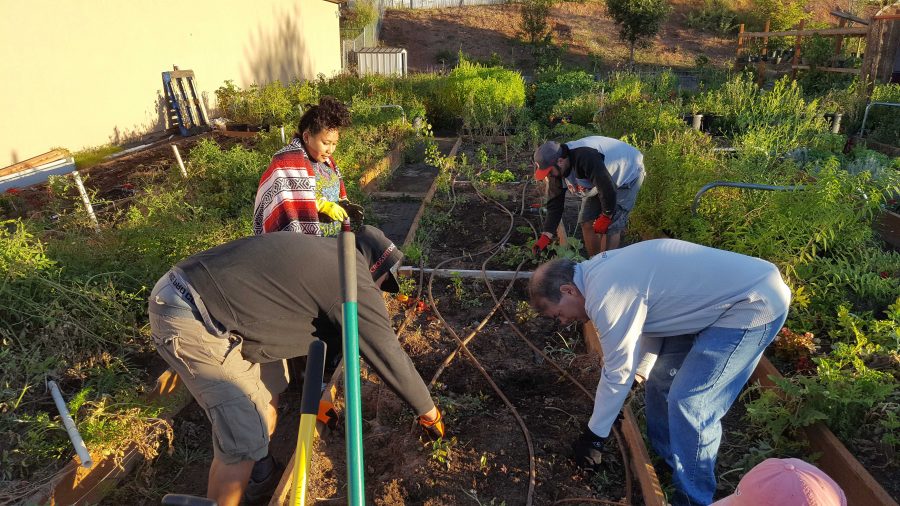Burton: It’s Time to Volunteer for Something Bigger Than Yourself
August 6, 2020
I’ve been mulling over a quote from Blaise Pascal for the last couple of months, “All of humanity’s problems stem from man’s inability to sit quietly in a room alone.” Despite being hundreds of years old, his astute observation seems even more apt as we practice social distancing. We are spending much more time sitting in our quiet, lonely homes — and it is aggravating. There are plenty of sensible reasons for people to be on edge, including the fear of catching a deadly virus, the brewing economic crisis and an uncertain future.
There’s another more subtle reason behind this feeling too — we don’t like to be bored. It creates an emptiness that many, including myself, are struggling to avoid. For many college students, social connections, work and academic opportunities are severely limited. Many young adults are finding convenient distractions through greater than average technology use. However, even during normal times, we don’t find ourselves any happier or meaningfully occupied with increased screen time. For some, they feel even more empty.
Now is the perfect opportunity to be more purposeful with our time and effort. Instead of watching from the sidelines as COVID-19 progresses, we can join the effort against COVID-19. We can offer up our time, attention and resources for a greater cause. If we want to find purpose during a period of personal limbo, we should dedicate ourselves to something bigger than our individual selves.
The Curses of Individualism and Disconnection
Individualism places emphasis on the individual and a person’s inherent worth. It values self-reliance, self-expression and freedom of choice. A classical liberal ideal, countries and societies have certainly benefited from this mindset — most notably the United States and Western Europe have grown more economically prosperous and socially mobile.
Growing up in an individualistic society, however, also brings the feeling that an individual is essentially alone — that we are solely reliant on creating satisfaction for ourselves. This mindset can be harmful and dehumanizing. It can train us to believe that our worth is dependent on our merit, how beautiful and intelligent we are, how our status compares or how much can we consume. As columnist David Brooks puts it, we are “a set of skills to be maximized.”
College students are facing this reality right now. Continually changing and hyper-competitive schools and workplaces can severely disorient the self-worth of young 20-somethings. This view of toxic individuality where we see relationships as either competitive or merely utilitarian leads to depression and negativity. Hyper-individualism isn’t new, but the pandemic has metastasized this cancer.
In addition to being physically distant, we are also distancing ourselves emotionally through self-serving distractions like social media and entertainment. These distractions are among the few sources of instant gratification we enjoy. The gratification is only temporary, and nothing that significantly builds your character. Fatigue from over-reliance on tech entertainment is familiar to many. It is understandably hard to find something to occupy ourselves when so much of our time is spent indoors. Yet in doing so, we are inadvertently avoiding what gives us far more satisfaction — connection.
Satisfaction Through Service
In Mandarin Chinese, satisfaction (满意, manyi) has a noticeably more nuanced definition than in English, literally translating to “fill with meaning.” It implies that satisfaction doesn’t just come from quenching a craving, but from meaningful experiences. It can be hard to find meaningful experiences while in solitude, but they are abundant when relationships are cultivated through service.
Many studies highlight how volunteering gives people more healthy and meaningful gratification and purpose. It allows for us to be physically active, in social contact with others and gives a conviction to be a part of, such as feeding the homeless, raising money for a charity or organizing for a social cause. Volunteering is often difficult, tiring and strenuous, but unlike our unhealthy lockdown habits, it will develop character.
How Can We Help?
COVID-19 has made everybody vulnerable. While governments are struggling to assist, there are many volunteer organizations nationally and in Utah helping and recruiting volunteers. In addition to the several organizations in Utah, student volunteers at the University of Utah are providing critical services such as blood testing and business recovery. Many of these student volunteers have had their career and academic plans disrupted, but through their volunteer service greatly fulfilled the needs of the community and themselves.
The internet has plenty of ways to connect you with volunteer organizations — some websites are specifically tailored for finding opportunities near you. Volunteer efforts don’t even have to be directly related to COVID-19 relief, such as meal preparation for a homeless shelter. Opportunities are available no matter our abilities or circumstances. For those of us social distancing and at a loss of what to do, volunteering can be a surprising remedy.
During high school and even up to my first semester in college, I was a pessimistic and awkward person — like many teenagers. Life was a day-to-day struggle against boredom. It wasn’t until I served an LDS mission and after when I continued volunteer work, that I realized the benefits of service and volunteerism reach far beyond the resume. In doing service as part of a greater community, I didn’t lose my sense of self. Instead, it made me more optimistic and confident than ever before. Yes, service is beneficial to the vulnerable, but it benefits everyone involved.








